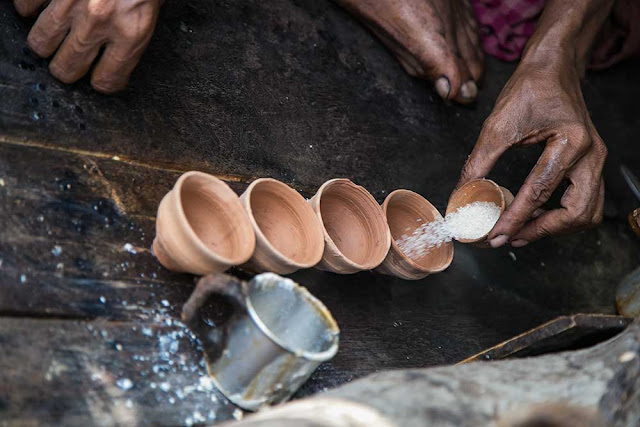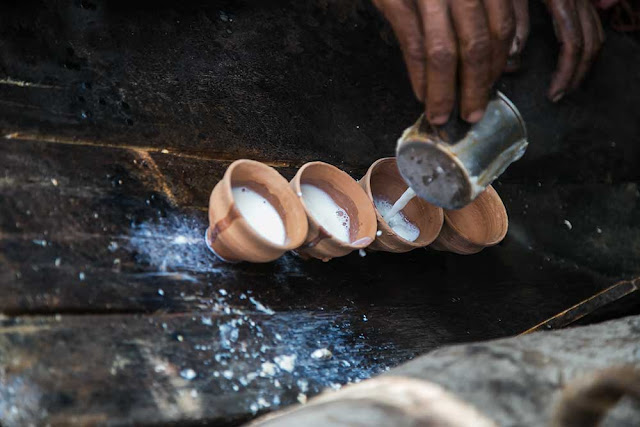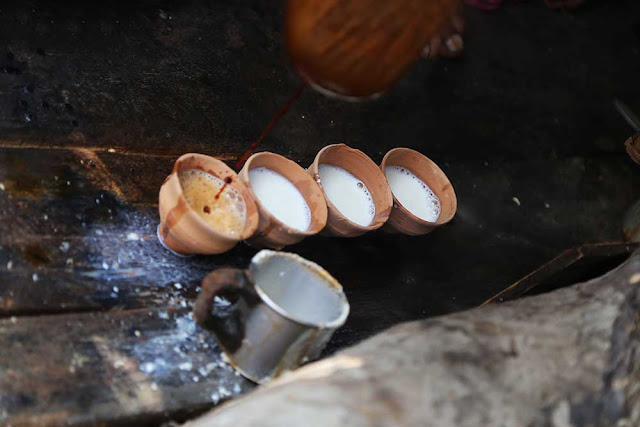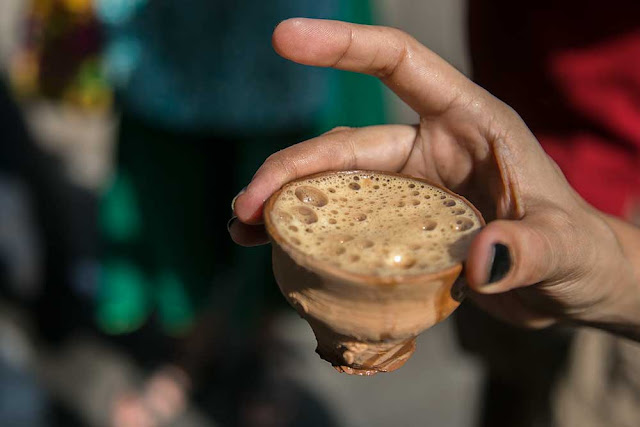Well what does
chai tea actually mean? Well chai means tea, and tea means tea, so chai tea literally means
'tea tea' :)
Being a true blood Indian, I love chai as much as I love coffee, and my day always starts with a HUGE cup of chai. Every single day. In fact I love it so much that I always make it for my family too, partly because I feel I make the best chai possible (the secret is to add loads of ginger and a bit of Indian basil). Ah I digress...
 |
| A cup of Indian chai |
Coming back to chai tea, I never knew this term existed till I was invited by my professor for a cup of coffee to Starbucks at the Stanford campus and I read it in the menu. I thought it was rather funny of Starbucks to call Indian tea by such ridiculous name. But I saw it everywhere, not just in US but also across cities in Europe. So now even when I walk on the
streets of Barcelona, and my heart calls out for Indian tea, I go to a cafe and ask for 'tea tea' :)
But recently I was in Kolkata for an early morning walk, and bumped into a small nameless shop which made Indian tea (which is just chai) in the most elaborate and beautiful way. With a piece of jalebi in one hand, I took out my camera and clicked a few pictures and here is a photo-story on how Indian chai is made on the streets of the country. What's most interesting was the fact that he served us chai in small mud vessels called
kullhad, which is way more sustainable and faster to degrade than plastic cups. Plus, it can be used only once so also more hygienic :)
Step 1: The process starts with laying the
kullhads in line.
 |
| Step 1 |
Step 2: The sugar is poured as per the taste.
 |
| Step 2 |
Step 3: This is followed by pouring steaming milk in each kullhad.
 |
| Step 3 |
Step 4: The next step is to put pre-prepared concoction of tea in each cup. More or less is added based on the taste. Some prefer light while others prefer strong chai.
 |
| Step 4 |
 |
| Here is the chai concoction :) |
Step 5: Using a mug the froth is created in the tea
kullhad.
 |
| Step 5 - making some froth! |
And finally, tea is ready to be served :)
 |
| My chai :) |
By the way did you know that the term chai comes from the Persian word Chay, which originally comes from the Chinese word chá.








Loved the post :)
ReplyDelete"Being a true blood Indian"...I have received questioning glares when I tell people I don't like tea...those looks say something like, "are you sure you are Indian?" :)
ReplyDeleteLoved this photo essay...the ubiquitous tea stalls...they have so many stories to tell. Your pictures are just shouting out loud, "step out, see the wonderful world around!"
Haha...I also started drinking tea after my post-graduation, but now my love oscillates between tea and coffee, and usually depends on where I am :)
DeleteI love the saturation in the photographs. Makes chai look even more appealing! :D
ReplyDeleteCannot imagine life without my two cups of tea daily.
ReplyDelete:-)
the photos are fantastic! and perfect timing- am mapping tea making in different parts of India, can I use this please? of course will credit you!
ReplyDeleteJust learned a new way to make cup of Chai.
ReplyDeleteSo nice shots!
ReplyDeleteI love "Kullhad wali chai" and so as your post. There is no comparison of flavour and earthy aroma from tea served in kullhad.
ReplyDeleteShared it ~ loved it so much :) ~
ReplyDeleteJust out of curiosity, is Assam masala chai tea similar with other masala tea in India (as in the ingredients)? I am a very tea person, and if someone offers me a cup of tea I would be likely to say yes in an instant. The masala tea that I had in Bhaktapur, Nepal is still one of the best I've ever tasted. This Assamese version looks equally intriguing though.
ReplyDeleteHi Siddhartha,
ReplyDeleteThis tea looks most delish.
I just left Istanbul where tea is the fave drink.
Guys sold it as "chai" on the street. Methinks they meant "tea" as opposed to chai we know to be chai here in the USA.
Great pics ;)
Ryan
Very Beautiful pics and nyc blog...Thanks For Sharing
ReplyDeleteThis comment has been removed by the author.
ReplyDeletewow, photography was fantastic and love the way how this man make tea in a kullad. I love kullad tea and its smell :P :D
ReplyDeleteInteresting facts, never knew Chai comes from a Persian word
ReplyDeleteWhat amazing pictures! Not a tea person but can't say no to ginger tea in khullar. And when I lived in Assam, the masala chai was all I had.
ReplyDeleteGood post.
That remind me of the school days. An "Adda" (gossip) at the tea stall after the tuition(3 hours at a stretch haha!) was much awaited
ReplyDeleteTea reminds me of home , i.e Darjeeling. Delhi weather doesn't allow me to drink tea as often but if offered I'm always up for some chai. :)
ReplyDeleteThe pictures are great and thumbs up on the step by step idea.
This comment has been removed by the author.
ReplyDeleteWow! What a great way to make Tea. Loved the way you described each step!
ReplyDeleteI am a Web Designer and a Part-time Freelancer and I also Love to travel and Explore the World, But couldn't make that much time for travelling. I like your blog to feed my inner thirst of Travelling. It keeps me Tempted.
Have a Great Time Sid...!
Your description and photos of the chai is so vivid I can smell and taste it!
ReplyDeleteSir plz plz tell me the location where i can get this tea stall
ReplyDelete